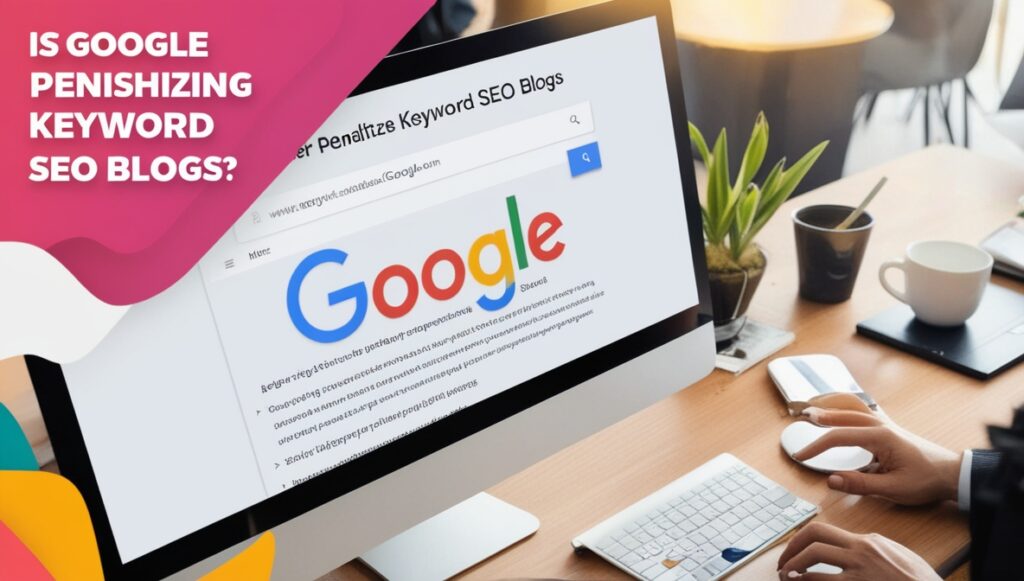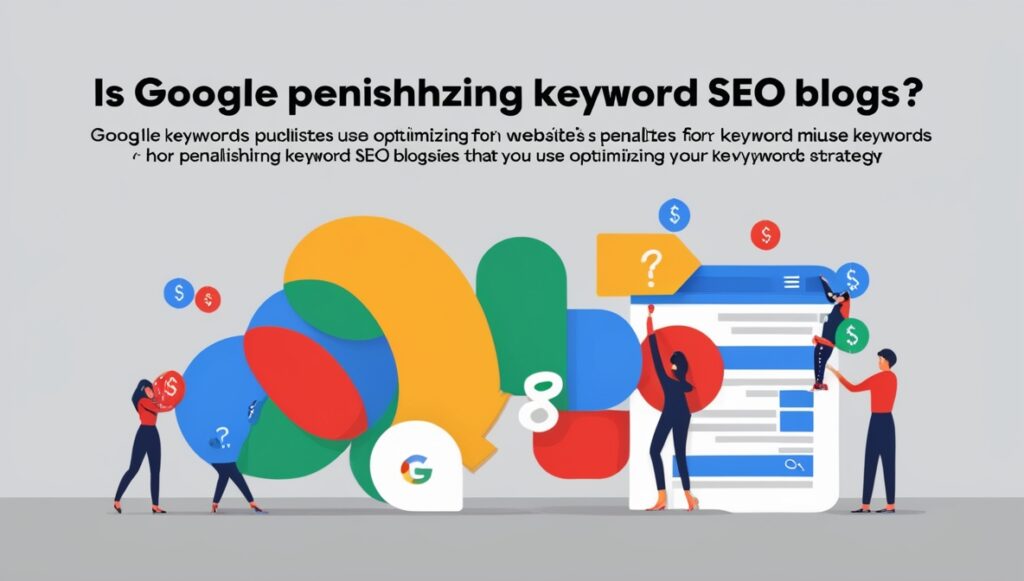
Search engine optimization (SEO) is the backbone of digital marketing, and for years, optimizing keywords has been a key strategy. However, with evolving algorithms and stricter guidelines, Google has become more vigilant about penalizing websites that use unethical keyword strategies. This leads to a pressing question for marketers and content creators: Is Google punishing keyword SEO blogs?
In this article, we will explore the factors behind Google’s penalties for keyword misuse, how these penalties affect websites, and best practices to optimize content while staying compliant with Google’s policies.
What Are Google Penalties?
A Google penalty occurs when a website’s ranking drops or is removed from search engine results pages (SERPs) due to violations of Google’s guidelines. Penalties can be manual or algorithmic:
- Manual Penalties: These occur when a Google employee identifies a policy violation on a website.Algorithmic Penalties: These are automated and triggered when Google’s algorithms, such as Panda or Penguin, detect unnatural or manipulative SEO tactics.
For keyword SEO blogs, the most common penalties arise from keyword stuffing, duplicate content, and low-quality backlinks.
How Does Keyword Misuse Lead to Penalties?

1. Keyword Stuffing
Keyword stuffing involves overloading a page with the same target keywords in an attempt to manipulate rankings. Google’s algorithms, particularly Panda, are designed to detect and penalize such tactics.
As Google’s guidelines explain, keyword stuffing includes:
- Repeating the same keywords unnaturally in content, meta tags, or anchor texts.Inserting irrelevant keywords to trick algorithms.Using hidden text (e.g., white text on a white background) to stuff keywords.
Why Keyword Stuffing is Penalized
Google prioritizes user experience. Keyword-stuffed content disrupts readability and often fails to deliver meaningful value to users. To combat this, the Panda algorithm penalizes over-optimized content.
“Keyword stuffing often goes together with deceptive SEO techniques, such as cloaking, content spinning, and so on, which altogether are a surefire way to sanctions. The Panda algorithm penalizes over-optimized content, and instead of ranking a stuffed page up, it will do just the opposite.”
2. Deceptive Practices
Blogs that use tactics such as cloaking (showing different content to users and search engines), content spinning (rewriting content to avoid plagiarism detection), and irrelevant keywords face severe penalties. These practices violate Google’s focus on authenticity and transparency.
3. Thin or Duplicate Content
Blogs with thin, plagiarized, or low-quality content are at risk of being flagged. Google expects unique, engaging, and informative content that provides real value to users.
Common Algorithms Responsible for Penalizing Keyword SEO Blogs
1. Panda Algorithm
The Panda algorithm focuses on content quality. Websites with thin, duplicate, or keyword-stuffed content are penalized, making it crucial for keyword SEO blogs to prioritize relevance and readability.
2. Penguin Algorithm
The Penguin algorithm targets manipulative link-building tactics and spammy backlinks. Keyword SEO blogs using unnatural anchor texts or link schemes may experience a drop in rankings.
3. Hummingbird Algorithm
Hummingbird emphasizes semantic search and user intent. Keyword stuffing without considering user context fails under this algorithm.
How Google Penalties Impact Keyword SEO Blogs
The consequences of Google penalties can be devastating for keyword SEO blogs:
- Traffic Loss: A sudden drop in rankings can lead to a significant decrease in organic traffic.Revenue Impact: For monetized blogs, penalties can result in lost ad revenue and fewer conversions.Brand Reputation: Being flagged by Google can harm your credibility and authority.Time and Cost of Recovery: Recovering from a penalty often requires substantial effort, including content revisions and link disavowal.
Best Practices to Avoid Penalties While Optimizing Keywords
1. Prioritize User Experience
Google rewards content that provides value to users. Write blogs that answer user queries, solve problems, and offer actionable insights. Avoid over-optimizing for keywords; instead, focus on natural language.
Tips:
- Use keywords naturally within the flow of your content.Optimize for LSI (Latent Semantic Indexing) keywords, which are contextually related terms.Incorporate long-tail keywords that match user intent.
2. Avoid Keyword Stuffing
Instead of repeating the same keyword excessively, diversify your strategy. Focus on creating topic clusters around your main keyword to improve relevance.
Example:
If your keyword is “SEO services,” create subtopics such as:
- “Benefits of professional SEO services”“How to choose the best SEO service provider”
3. Focus on High-Quality Content
Invest time in creating comprehensive, engaging, and well-researched blogs. High-quality content is more likely to rank and attract natural backlinks.
Key Elements:
- Write blogs that are 1,500–2,000 words long.Incorporate visuals, infographics, and examples.Ensure content is original and free from plagiarism.
4. Monitor Backlinks and Anchor Texts
Avoid using exact-match anchor texts excessively. Use a mix of branded, generic, and keyword-rich anchor texts to maintain a natural profile.
Tools to Use:
- Google Search ConsoleAhrefsSEMrush
5. Conduct Regular SEO Audits
Periodic audits help identify potential risks and ensure compliance with Google’s guidelines. Check for:
- Broken linksDuplicate contentSlow page speedsSpammy backlinks
6. Stay Updated with Algorithm Changes
Google updates its algorithms frequently. Follow reliable sources like Google’s official blog, Search Engine Journal, and Dust Digital Marketing’s blog to stay informed about changes that could affect your keyword SEO strategy.
How to Recover from a Google Penalty
If your blog is penalized, take these steps to recover:
- Identify the Issue: Use tools like Google Search Console to determine the penalty cause.Fix the Problem: Revise keyword-stuffed content, disavow spammy backlinks, or remove duplicate pages.Submit a Reconsideration Request: If you’ve addressed the issue, submit a request to Google for manual penalties.Monitor Performance: Track your website’s traffic and rankings to ensure recovery.
Case Study: A Keyword SEO Blog’s Recovery
Scenario: A blog focused on SEO tips experienced a manual penalty for keyword stuffing and duplicate content.
Steps Taken:
- The site revised its content to remove excessive keywords and added value-driven sections.Duplicate articles were consolidated into comprehensive guides.A backlink audit was performed to disavow spammy links.
Result: The blog’s organic traffic rebounded by 120% within three months, demonstrating the importance of adhering to Google’s guidelines.
Conclusion: Navigating Keyword SEO Safely

The fear of penalties should not discourage marketers from leveraging keywords in their blogs. Instead, it should serve as a reminder to use them ethically and strategically. By prioritizing user experience, high-quality content, and compliance with Google’s guidelines, keyword SEO blogs can thrive without risking penalties.
At Dust Digital Marketing Ltd., we specialize in creating SEO strategies that balance optimization with compliance. If you’re looking to grow your online presence without fear of penalties, join our SEO service today. Visit Dust Digital Marketing to learn how we can help you succeed.

